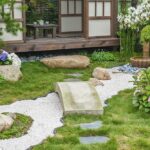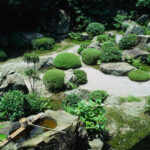Japanese garden design is a traditional art form that dates back centuries. Known for its simplicity, elegance, and harmony with nature, Japanese gardens are designed to create a peaceful and serene environment for contemplation and reflection. The design of these gardens is influenced by Zen Buddhism, which emphasizes the importance of simplicity, contemplation, and inner peace.
One of the key elements of Japanese garden design is the use of natural materials such as rocks, gravel, water, and plants. These elements are carefully chosen and arranged to create a sense of balance and harmony within the garden. Rocks are often used to represent mountains or islands, while water features such as ponds or streams are used to symbolize rivers or seas. Gravel is often raked in patterns to represent waves or ripples in water.
Another important aspect of Japanese garden design is the use of symbolism. Many elements in a Japanese garden hold deep symbolic meaning, such as the use of lanterns to represent enlightenment or the placement of stepping stones to guide visitors on a spiritual journey. Plants and trees are also selected based on their symbolic significance, such as the use of pine trees to represent longevity or bamboo to symbolize resilience and flexibility.
One of the most famous types of Japanese garden design is the dry rock garden, or karesansui. These gardens feature carefully placed rocks and gravel, with little to no vegetation, creating a minimalist and meditative space. Raked patterns in the gravel represent flowing water or waves, adding a sense of movement and tranquility to the garden.
Japanese gardens are also designed to be viewed from a specific vantage point, such as a teahouse or pavilion. This allows visitors to appreciate the garden in its entirety, taking in the carefully planned layout and design from a distance. This encourages a sense of mindfulness and contemplation, as visitors are encouraged to slow down and appreciate the beauty of their surroundings.
Overall, Japanese garden design is a reflection of the culture and philosophy of Japan, emphasizing simplicity, harmony, and a deep connection with nature. By creating a space that fosters contemplation, reflection, and inner peace, these gardens offer a welcome respite from the busyness of everyday life and serve as a reminder of the beauty and tranquility that can be found in the natural world.
















